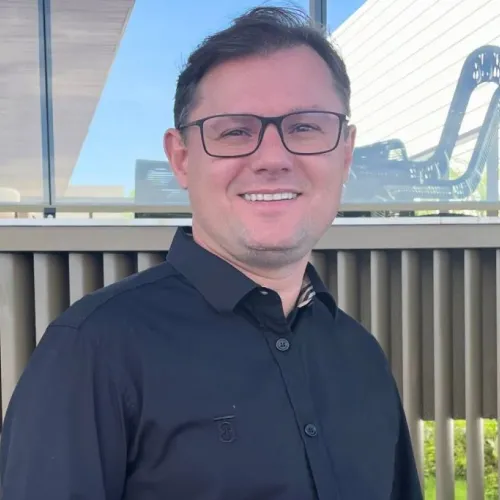
News
01/07/2025

Learn how the new generation of agribusiness leaders, directly descended from the pioneers of large-scale farming in Brazil’s Central-West region, is shaping the future.
Kleverson Maggi Scheffer is one of the sons of Eraí Maggi Scheffer, co-founder of Grupo Bom Futuro — one of the pioneers of large-scale agricultural production in Brazil’s Central-West and a public figure within the company. Based in Mato Grosso, Bom Futuro is now one of Brazil’s largest agribusiness companies, operating primarily inside the farm gate, where most of its business is concentrated. This year, the company expects revenues between R$8 billion and R$10 billion.
“We have a land full of opportunities,” he said in an exclusive interview with Forbes. “Producers here will always reinvest.” Kleverson is a key figure in the succession process now underway in many agribusiness companies that flourished in the Central-West and are either transitioning leadership or preparing to.
At 43, carrying one of the most recognized surnames in Brazilian agribusiness means looking beyond the farm gate. Bom Futuro farms around 650,000 hectares of soybeans, corn, and cotton across 35 production units. It also has a cattle operation, processing between 90,000 and 100,000 head of cattle per harvest, fish farming, seed production, and an infrastructure that includes 22 grain silos with static capacity of about 1.5 million tons. All of this requires electricity — one of the most crucial resources for a country's development.
Energy generation is part of that broader vision. Kleverson has been working at Bom Futuro for two decades. He joined the company just as it was beginning to structure one of its most important non-farming divisions: energy generation, especially through small hydroelectric power plants (SHPs). At the time, he was only 23 and still studying agronomy in Várzea Grande (MT), while his siblings pursued business degrees.
He left university before completing his degree, driven by the opportunity to learn through practice. “My father said I had to learn by doing,” he recalls. His starting point was a leased farm in Chapada dos Guimarães, where he split his time between fieldwork and attending classes. Eventually, he chose the farm, and the experience shaped his business mindset.
In 2006, Kleverson spent time in the United States, sent by his father. Upon returning, he found the company engaged in its first energy projects. The headquarters for this division was set up in Cuiabá, and he quickly took an active role in its development. “This part became part of my bloodstream — I’m still leading hydroelectric energy generation today through Bom Futuro Energia,” he says.
In addition to energy, he also heads the group’s New Business division, which includes real estate, airport operations, and security. He led the development of the Luzia Maggi Scheffer Executive Aviation Terminal in Cuiabá and manages the group’s internal security company, which ensures compliance with Federal Police regulations related to the airport.
The newly inaugurated passenger terminal — a R$25 million investment completed just over a month ago — was one of his initiatives.
While agriculture remains the group’s core business, he has structured these new ventures independently from the farming operations. He works in a division more connected to urban and structural assets than to the field itself. “My work has made me more urban, less of a farmer,” he says. Even so, he remains a rural producer through a private project alongside his siblings and other family members, with farms in Chapada dos Guimarães and Campo Novo do Parecis — assets that are outside the group’s scope.
The group has an installed capacity of 200 megawatts (MW) from SHPs. In addition, it has solar capacity equivalent to 10% of that, primarily used for internal supply across its production units. Altogether, there are 12 hydro plants and 3 photovoltaic plants. The energy investment has evolved into a separate business: only 10% of the energy produced is consumed by the group itself — the rest is sold to the regulated market through contracts with the national grid.
But the challenges are significant. Changes in rainfall patterns have forced the company to adopt new water management strategies. According to Kleverson, the current performance of the hydro plants has fallen below expectations based on past decades’ projections. “Our studies show the cycle has changed. Rainfall patterns are no longer the same,” he says.
This has led the company to over-engineer infrastructure like dams to ensure safety during extreme weather events. Still, Kleverson remains optimistic. He anticipates that the coming years will bring more rainfall, positively impacting energy generation.
That also means an increased focus on environmental preservation and sustainability. Bom Futuro maintains 380,000 hectares of protected environmental areas, including Legal Reserves and Permanent Preservation Areas (APPs). Kleverson recalls accompanying his father in discussions about development and infrastructure for Mato Grosso over 20 years ago. “Mato Grosso has always had great potential. Today, we have a vibrancy that must be understood as something positive,” he says, referring to investments in the state's agro-industrialization — which would further diversify the sector’s economic opportunities.
Vera Ondei - Forbes Agro
Source: https://forbes.com.br/forbesagro/2025/06/kleverson-maggi-scheffer-o-que-pensa-e-faz-a-nova-geracao-do-grupo-bom-futuro/
